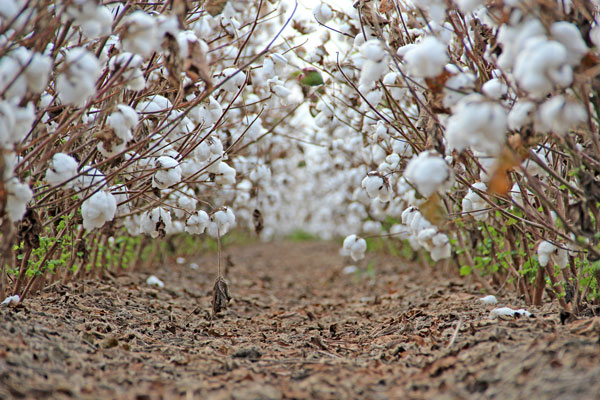
The Deltapine brand of upland cottonseed was the most popular planted in the United States in 2014, according to USDA’s Agricultural Marketing Service’s Cotton and Tobacco Program.
Bayer CropScience’s Fibermax brand was the second most popular followed by PhytoGen, Bayer CropScience Stoneville, Americot, Dyna-Gro and All-Tex.
The most popular individual cotton variety in the United States in 2014 was PHY 499 WRF, planted on 9.25 percent of U.S. acres, followed by ST 4946 GLB2, 6.7 percent, DP 1044 B2RF, 6.67 percent, FM 1944 GLB2, 6.04 percent and FM 2484 B2F, 4.38 percent.
For the latest on southwest agriculture, please check out Southwest Farm Press Daily and receive the latest news right to your inbox.
DP 1044 B2RF, at 9.9 percent, was the most popular variety planted in the Southwest, followed by FM 2484 B2F, 7.19 percent, PHY 499 WRF, 6.17 percent, NG 1511 B2RF, 5.85 percent and FM 1944 GLB2, 5.46 percent.
ST 4946 GLB2, at 29.92 percent, was the most popular variety planted in the Mid-South, followed by PHY 499 WRF, 14.46 percent, DP 0912 B2RF, 7.8 percent, FM 1944 GLB2, 6.5 percent and PHY 375 WRF, 5.8 percent.
DP 1252 B2RF, at 14.97 percent, was the most popular cotton variety planted in the Southeast, followed by PHY 499 WRF, 14.44 percent, DP 1050 B2RF, 14.4 percent, ST 6448 GLB2, 12.08 percent and DP 1137 B2RF, 9.65 percent.
DP 1044 B2RF, at 15.28 percent, was the most popular upland variety planted in the Far West, followed by DP 0912 B2RF, 6.89 percent, ST 4946 GLB2, 5.93 percent, PHY 499 WRF, 4.96 percent and DP 1219 B2RF, 4,49 percent.
Transgenic varieties, genetically-engineered varieties resistant to worms, herbicides, or both, accounted for about 99.5 percent of the upland cotton planted in the United States in 2014.
Use of transgenic varieties in 2014 was reported at 100 percent in Alabama, Arkansas, Arizona, Florida, Kansas, Louisiana, Missouri, New Mexico, North Carolina, Oklahoma, Tennessee and Virginia. Other states planted from 97.4 to 99.9 percent transgenic.
Deltapine brand varieties accounted for 29.9 percent of U.S. acreage in 2014. The brand accounted for 47.2 percent of the acreage planted in the Southeast, 20.2 percent in the Mid-South, 25 percent in the Southwest and 37.1 percent in the West.
Deltapine’s most popular varieties were DP 1044 B2RF, DP 1252 B2RF, DP 1050 B2RF, and DP 1219 B2RF, accounting respectively for 6.7, 3.9, 3.4, and 2.9 percent of the U.S. upland cotton acreage.
Bayer CropScience Fibermax brand varieties accounted for 22.7 percent of U.S. acreage in 2014. These varieties accounted for 8.8 percent of the acreage planted in the Southeast, 6.5 percent in the Mid-South, 32 percent in the Southwest and 17.3 percent in the West.
The most popular Bayer CropScience Fibermax varieties were FM 1944 GLB2, FM 2484 B2F, FM 2011 GT and FM 2989 GLB2, accounting respectively for about 6, 4.4, 2.7 and 1.8 percent of U.S. acreage planted to upland cotton.
PhytoGen brand varieties were the third most popular planted in 2014, accounting for 15.3 percent of U.S. acreage. They accounted for 24.6 percent of the acreage planted in the Southeast, 24.5 percent of the acreage in the Mid-South, 9.4 percent in the Southwest and 20.2 percent in the West.
The most popular PhytoGen brand varieties were PHY 499 WRF, PHY 375 WRF and PHY 339 WRF, accounting respectively for 9.3, 2.1 and 1.1 percent of U.S. acreage planted to upland cotton.
Bayer CropScience Stoneville brand varieties were the fourth most popular planted in 2014. These varieties accounted for 12.4 percent of the acreage planted. They accounted for 15.6 percent of the acreage planted in the Southeast, 43.4 percent of the acreage in the Mid-South, 3.8 percent in the Southwest and 17 percent in the West. The most popular Bayer CropScience Stoneville varieties were ST 4946 GLB2, ST 6448 GLB2 and ST 5289 GLT accounting respectively for 6.7, 3, and 0.6 percent of U.S. acreage planted to upland cotton.
Americot brand varieties were the fifth most popular and accounted for about 12.3 percent of U.S. acreage planted in 2014. Dyna-Gro varieties were the sixth most popular and accounted for about 4.1 percent of the 2014 cotton acreage. All-Tex varieties were the seventh most popular and accounted for about 2.4 percent of the 2014 cotton acreage.
PhytoGen was the most popular brand of American Pima varieties planted in 2014. PhytoGen variety PHY 805 RF accounted for 38 percent of U.S. Pima acreage. PhytoGen’s PHY 811 RF was the second most planted American Pima variety and accounted for 24.6 percent of the U.S. crop. PhytoGen’s PHY 802 RF was the next most popular variety and accounted for 17.9 percent of the U.S. Pima acreage.
Bayer CropScience FM 958, AFD 2485 and All-Tex 7A21 were the predominant varieties planted by organic cotton producers. Other varieties planted by organic producers include All-Tex LA122, Seed Source Genetics CT 210 and Downer Cotton Genetics DCG 1374.
Estimates of the percentage of the various varieties of cotton planted in the United States for 2014 were based on informal surveys made by the Cotton and Tobacco Program Classing Offices. Those surveyed included ginners, seed dealers, extension agents, and other knowledgeable sources.
About the Author(s)
You May Also Like






